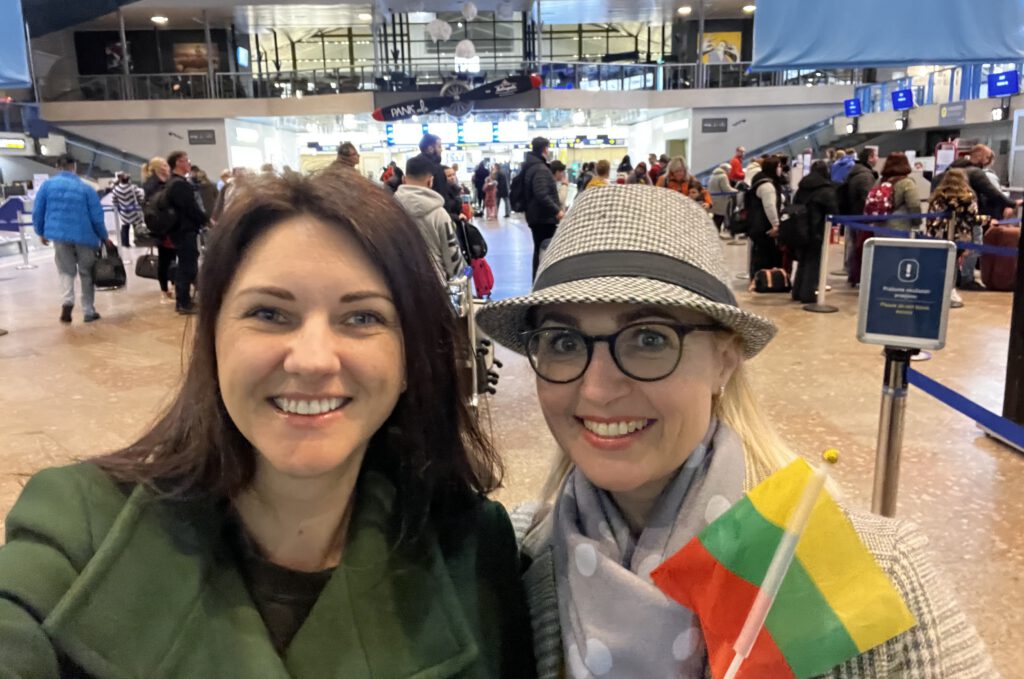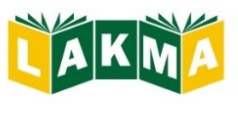



Diana Galatiltienė, LAKMA Board member, LAKMA secretary
Kristina Urbonienė, LAKMA president
The 56th International IATEFL Conference took place in the beautiful spa town of Harrogate this year. Such conferences have always been a time to come together and celebrate our profession and its advances through the work of our colleagues, sponsors, and contributors. Over a few days, we had the chance to interact with like-minded colleagues, learn about the latest developments in the field, and access the most cutting-edge educational resources in the ELT world. It was a pleasure and a huge responsibility for us to participate in the conference and represent the Lithuanian Association of Teachers of English as a Foreign Language.
IATEFL and the IATEFL Associates bring together a combined community of over 100,000 English language teaching professionals around the globe. IATEFL associate members are groups who are affiliated to the organization and agree to act as ambassadors. In return, they get certain benefits, including free places at the IATEFL conference – on condition that the delegates attend the Associates’ Day. This year we were lucky enough to be LAKMA representatives. A successful Associates’ Day was held the day before the main conference – on April 17, 2023 and was attended by nearly 45 representatives from Associate teaching associations worldwide. The day included talks by 12 Associate representatives on topics of best practice, specific projects, and the challenges and successes they have faced.
The conference was opened by the IATEFL President Gabriel Diaz Maggioli and then followed by the IATEFL Patron David Crystal who announced his plan to step down from his role as Patron after 30+ year relationship with the association.
The first plenary speaker Evan Frendo in his session “English for the workplace – looking for new answers” shared insights about workplace language teaching from many people who have influenced him over the years. He referred to perspectives from a range of researchers and ELT professionals who work in the field, but, perhaps more importantly, he discussed what other stakeholders have been saying and doing, from top decision makers in multinational companies, to
learning and development professionals in different parts of the world, and to the many English language users in these organizations whose voices may not be as loud or influential, but whose language learning efforts are nevertheless essential to overall success. Evan helped us all think about the changes that are happening in workplace language teaching, and how new answers are needed if we are to remain relevant.
Wednesday’s plenary “Lean on me: stories of coaching, mentoring and teacher resilience” was given by Divya Madhavan. According to Divya, of all the amazing things teachers achieve in classrooms around the world every day, one of the most amazing is perhaps how much teachers show up, to be there, to ensure presence. Teachers have always been the heroes of quieter revolutions, such as tolerance and understanding, achieved only through education. And as teachers of the world’s international language, we know this reality of fostering understanding and acceptance through better communication all too well. We have always been the ones who fight the good fight that is education.
On Thursday, participants of the conference had a chance to listen to Lesley Painter-Farrell, who shared her viewpoints on various ESOL teachers’ roles in the plenary talk “Sharing words and worlds: ESOL teachers as allies, advocates, and activists”. Lesley reminded all of us that the field of ESOL teaching is growing exponentially, as is the global humanitarian crisis of forced displacement and migration. According to Lesley, it is a complicated context that presents ESOL teachers, many of whom are volunteers, with multiple challenges. Their learners have possibly left war-torn countries, suffered trauma, and made harrowing journeys to find safety. Many have had interruptions in their education and maybe have low literacy in their first languages. The English language classroom is often the primary space for them to share their stories, be listened to, feel welcomed, and learn about practical resources they need to help them settle into their new homes. It is a place to access and understand the new country’s culture while making sense of their identities and finding their voices. ESOL teachers have to adopt many roles to address their learners’ multidimensional needs which often extend far beyond simply teaching English. Their work has been compounded by the surge in the pervasive anti-immigrant rhetoric many of us have witnessed in recent years. ESOL teachers are their learners’ allies, advocates, and activists.
Friday offered two plenary talks: “Translanguaging and teaching English as a foreign language” given by Ofelia García and “Race, popular culture and ESL in a post-George Floyd moment” by Awad Ibrahim.
In her presentation, Ofelia García raised some questions on how translanguaging theory has shifted our perspective on the English language and what this means for thinking of how EFL students become bilingual in different sociocultural contexts. The speaker also went deeper into what the pedagogical implications of understanding bilingualism/multilingualism from a translanguaging perspective are. This presentation showcased two EFL teachers who had developed what we call a translanguaging juntos stance. One of the teachers was from a Latin American country; the other was from a European country. Ofelia discussed the different national sociolinguistic and socioeconomic/ political contexts, the ideologies of policy makers, students, and teachers, and how these impact the take-up of translanguaging theory among educators who teach English as a foreign language.
In the first part of his presentation “Race, popular culture and ESL in a post-George Floyd moment” Awad Ibrahim showed theoretically how race works exactly like a language, with its own syntax, morphology and phonology. The second part of the presentation was to link these arguments to pop culture and in turn link the two (race and pop culture) to the field of ESL. The speaker emphasized that it is high time that we engage race and pop culture in our ESL classrooms, and offered a concrete unit plan that does exactly that. Participants of the conference could see how pop culture, namely Hip-Hop, can be engaged in an ESL classroom.
The most exciting moment for us was our workshop on the first day of the conference (April 18th) called ‘Listen with Your Eyes as Well as Your Ears!’ In this workshop, we shared some tips on how to make listening practice more attractive and joyful both for teachers and their students. The teachers were presented with tools which allow them to use videos and create quizzes based on what students see and hear.
Talking about the Exhibition, we can say it was a showcase of the latest resources, services and publications from international course providers, publishers, digital innovators and many more! It has always been a much loved aspect of the conference as it offers the perfect opportunity to find out about the latest ELT products and services, and to connect with a variety of organizations.
We would like to thank LAKMA Board members whose trust and support enabled us to participate at one of the world’s largest events for teachers of English. We had a great opportunity to grow both personally and professionally and at the same time we established contacts which will help LAKMA get stronger and find more engaging ways to unite professionals in Lithuania for common activities and events.
